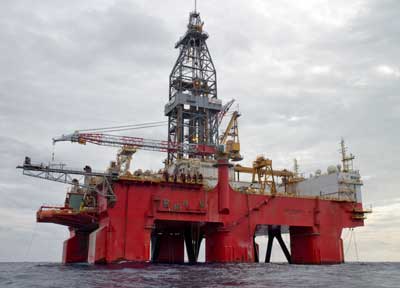Global Maritime Consultancy & Engineering, a provider of marine warranty, dynamic positioning and engineering services to the offshore sector, has completed an offshore deadweight survey and inclining experiment at the same time as ongoing drilling operations for Seadrill’s deep water semi-submersible drilling vessel West Pegasus.
The successful project is the first time an inclining experiment has been conducted for a DNV GL-classed drilling vessel in parallel with ongoing drilling operations. According to Global Maritime’s Houston team that carried out the project, the experiment’s successful completion has saved the client at least US$10-15 million in downtime and transit costs and incurred less than half a day of official down time.
 West Pegasus. Photo credit: Tom Burns, Global Maritime
West Pegasus. Photo credit: Tom Burns, Global Maritime
Inclining experiments are typically conducted in an inshore area sheltered from wind and waves, with the vessel at least partially unloaded in order to ensure measurements of sufficient accuracy. This project, coordinated by Global Maritime, however, took place with the semi-submersible fully loaded 160 kilometers offshore Mexico and with end of well activities still underway.
David Sutton, CEO of Global Maritime Consultancy & Engineering, said: “Against the backdrop of a challenging market, it’s more important than ever to demonstrate innovation, value and improved efficiencies for our customers. That is what we are committed to at Global Maritime and that is what we have demonstrated with this project.”
His words were backed up by Global Maritime’s Chief Naval Architect, Tom Burns: “Careful planning, hard work and innovative solutions were necessary to complete the scope of work within the extremely aggressive schedule and logistical limitations. Such enhancements improved the accuracy of the results and delivered for the client.”
Other solutions that Global Maritime developed as part of the project included the design and fabrication of customized measurement instruments as well as a temporary system to allow the recording of vessel drafts from within the hull, eliminating the need to read the external draft marks from a small boat.
A deadweight survey determines the lightship weight, which directly affects how much a ship can carry. An inclining test determines the coordinates of its vertical center of gravity, which is required to determine a vessel’s stability. The International Maritime Organization (IMO) specifies inclining test requirements and procedures.

